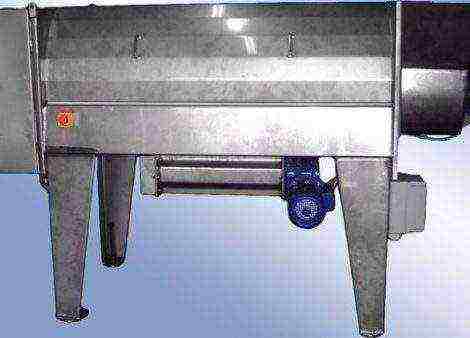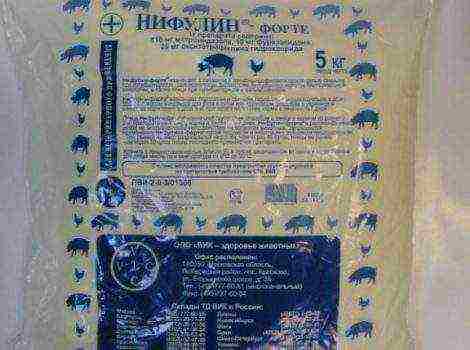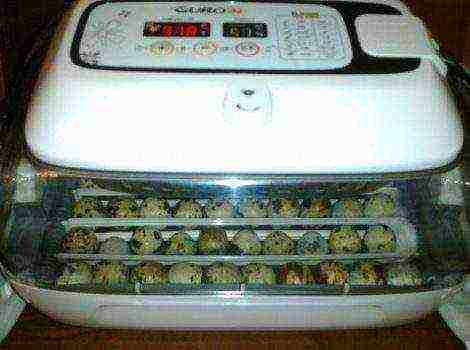Content
15 breeds of geese for breeding at home
What is valued in geese? Meat, eggs, fluff, life expectancy?
What to be guided by when choosing your breed for breeding? There are many varieties of birds, some are radically different from their counterparts. In this article, we will look at the best types of geese for home breeding and personal farming.
The best goose breeds for home breeding and personal farming
Kholmogory goose
The Kholmogory breed is exclusively for economic purposes. Not practical. It is displayed exclusively for decorative purposes because it is expensive to maintain due to the complexity of removal.
Sexual maturity occurs at the age of 3 years, life expectancy reaches 17 years.
The disadvantages include: low productivity (10-15 eggs per year) and the survival rate of offspring (up to 50%), although this makes the bird more valuable.
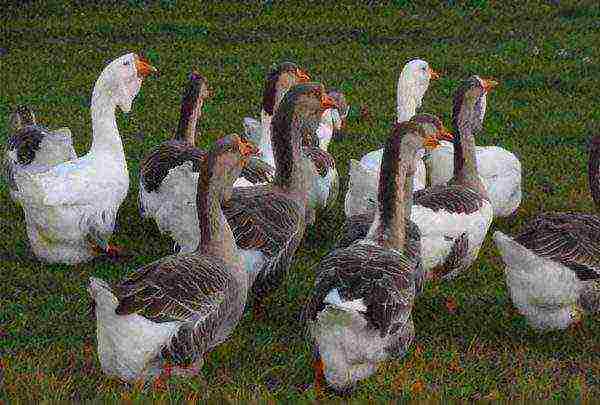
Large Ukrainian gray
Ukrainian gray or as they are also called large gray. It is a young breed, with a large gray body and brightly colored beak and legs. It is one of the most preferred by farmers. They fatten up quickly, are unpretentious in care and food, fertile and strong in health.
Within the breed are divided into:
- Ukrainian
- Tambov
- Uralsky.
The adult species gains up to 7, and sometimes up to 9 kg of live weight, and females can lay up to 60 eggs per year, the hatchability of eggs is about 70%, which is good. This is an excellent poultry for fattening liver.
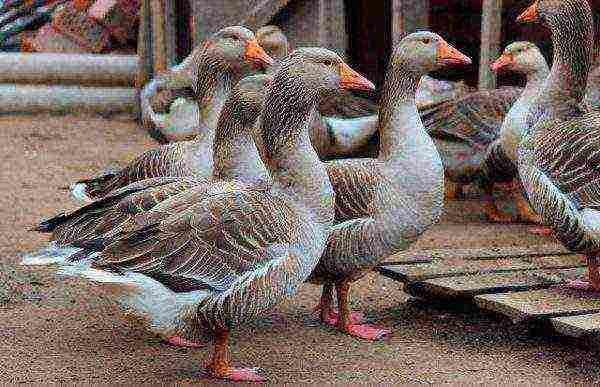
Toulouse
The Toulouse bird has French roots. The weight of the black Toulouse reaches 12 kg, the goose up to 7 kg of live weight. The liver is also in demand, the weight of one specimen reaches 500 grams.
PS It is famous for its high growth rates, good weight gain, unpretentiousness to feed. Also, the Toulouse have good indicators of a set of fat reserves and fluff.
Flaws: sensitivity to temperature changes, drafts, high humidity and little or no maternal instinct.
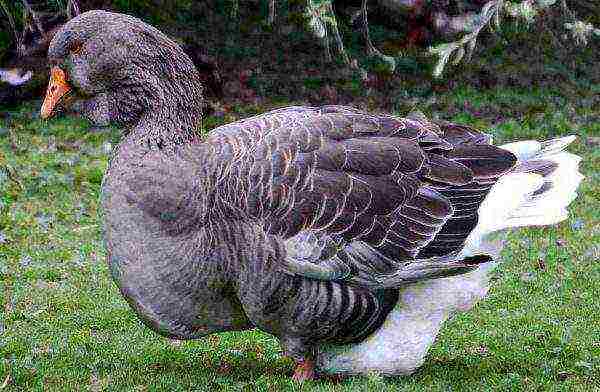
Italian white
The Italian white arrived in the USSR in the 70s from Czechoslovakia, where she came from sunny Italy. Despite the warm climate familiar to this bird, they perfectly adapted to our weather conditions. Blue-eyed with snow-white plumage, bright orange beak and paws.
The size and shape of the body, the length of the neck, wings and tail - everything is harmoniously folded, the average size does not allow attributing this breed to either large or small, this is the golden mean in a snow-white performance.
By 2 months, he is gaining about 4 kg. It's time to sell for meat. Adults weigh about 6 kg. Perfect for smoking, as this bird does not tend to accumulate excess fat.
Egg production is 45-50 eggs per year, but up to 90 eggs can be collected, since the breed quickly reaches puberty and begins to lay early, you can collect eggs twice a year.
Productive age up to 5 years.
Disadvantages: there is absolutely no maternal instinct, without an incubator it is unlikely that it will be possible to grow this breed.
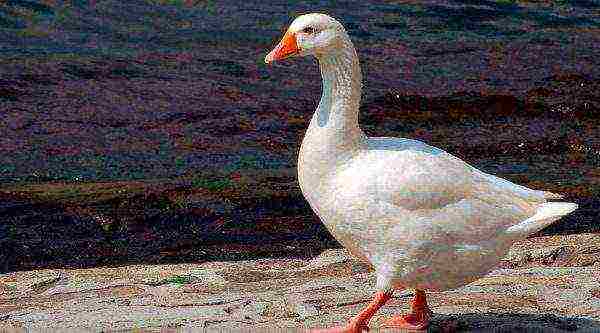
Legart Danish
The main purpose of breeding is fluff. For a year, he can give up to 500 grams of fluff. Starting from one year of age and repeat the procedure every one and a half months.
Legard is an affectionate and sensitive bird, loves warmth and stability in care, the diet is monotonous throughout the year, as well as the temperature regime.
Flaws: low rates of carrying eggs, poor survival rate of offspring, the need for incubation rearing.
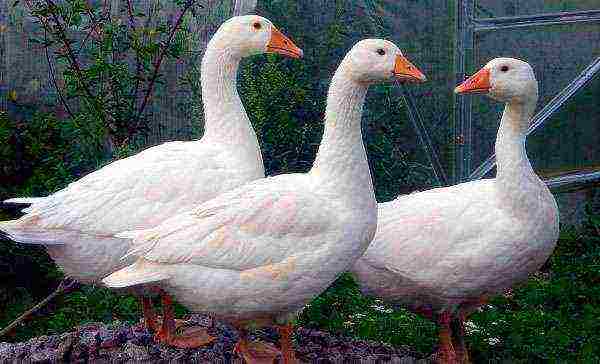
Governor's geese
The breed is quite fresh. They were bred by crossing Shadrinskaya and Italian birds. The weight of an adult male is 4-5 kg, the female lays about 45 eggs per year. Good hatchability and survival rate (over 95%).
The species has good characteristics in terms of both egg production and meat quality.
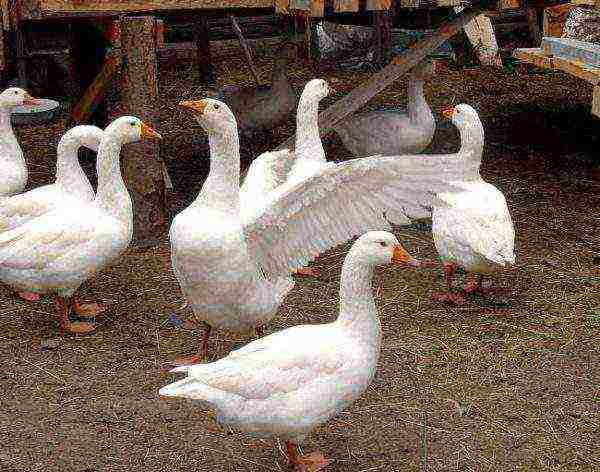
Chinese geese
One of the breeds that are bred for the sake of eggs. One female lays up to 100 eggs per year, this is not much less than a chicken. The quality of meat is highly valued, but keeping it for the sake of meat is not profitable, since the weight of an adult male is only 4-5 kg.
Flaws: not particularly developed maternal instinct. And increased aggression during the laying of eggs. The tribe should be watched more closely.
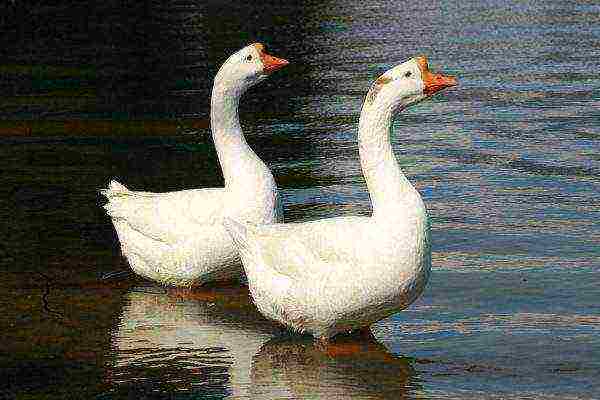
Mamut
The breed was brought from Denmark. The weight of an adult female is up to 9 kg, and that of a male is more than 13 kg. High egg production for birds - about 50 eggs, good survival rate and viability of offspring - up to 82%.
But a weak maternal instinct. The absence of a reservoir is hard to bear.
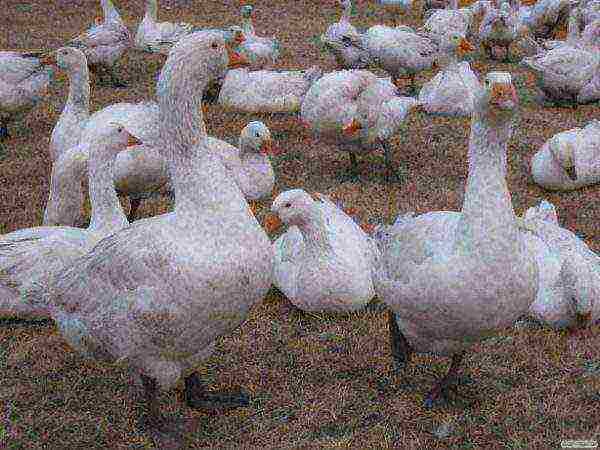
Ural white
The breed has excellent immunity, tolerance to various weather and climatic conditions, consistently transmitting selective qualities to the offspring.
The female lays about 50 eggs per year, the hatching percentage is more than 80%, the brood survival rate is very high up to 95%. The weight of the Ural whites is not great, the adults reach a weight within 5-6 kg.
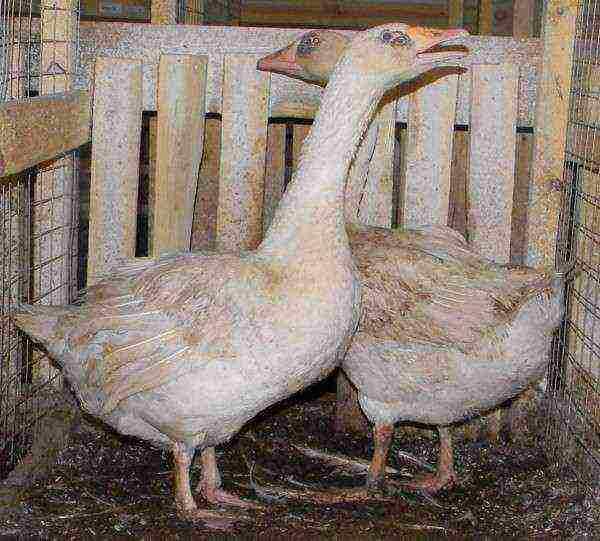
Shadrinsk
The Shabrin bird does not belong to the pampered. However, floors should be kept dry and warm. The comfortable temperature for this species is around 18 degrees.
An adult weighs about 6 kg, not much for the male, but the meat is of high quality and highly prized, making this bird attractive to breeders. The liver is also in good demand. The liver weighs up to 400 grams.
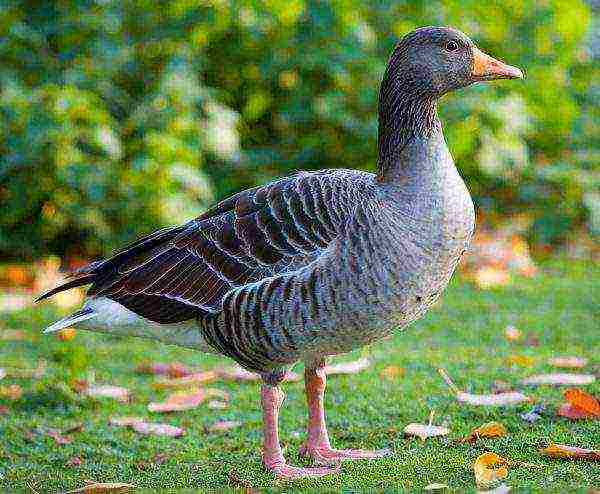
Tula bird
The weight of the Tula geese is about 6 kg, the egg production is the smallest, so why are they appreciated? The fact is that this is the only fighting breed. It is not difficult to breed it, Tula birds can swim even in severe frosts, the heat will not break them either. As true fighters, they steadfastly endure all conditions, but still have to follow the diet. Gaining excess weight threatens to lose the form of a fighter.
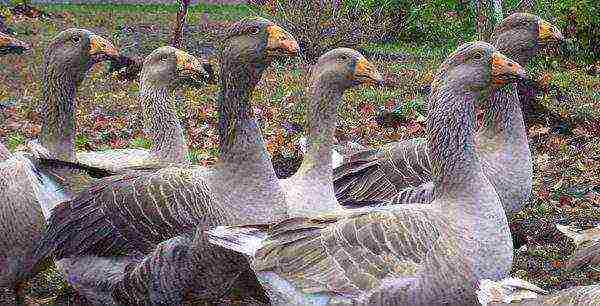
Kuban gray
The Kuban bird was bred by crossing the Gorky and Chinese geese. The weight of an adult goose fluctuates around 5-6 kg. For a year, females lay up to 90 eggs from which about 75-85% of the offspring are hatched. The survival rate of goslings is 85%.
Bad mothers do not like to incubate eggs and care for their offspring.
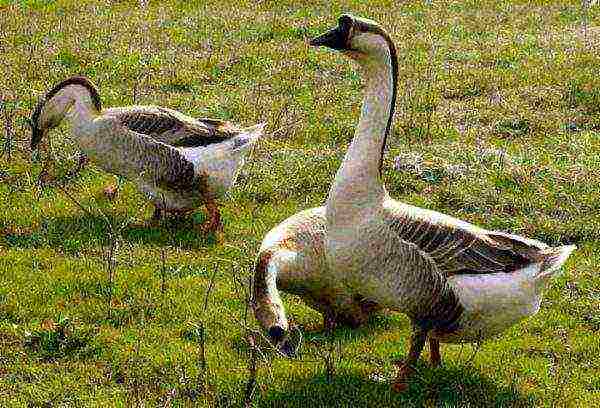
Linda
Early maturing beef breed Linda. the weight of an individual reaches 7-8 kg. Sexual maturity at 8 months. fertility of eggs 90% with hatchability 80%. Egg production 45-70 eggs. Lind is bred not only for meat, but also for fluff.
Perfect for a novice farmer. Geese are not whimsical in food and care, they quickly adapt to any weather conditions. Profitability reaches 100% with easy maintenance.
It is also recommended to equip secluded dark corners for this bird, they love solitude.
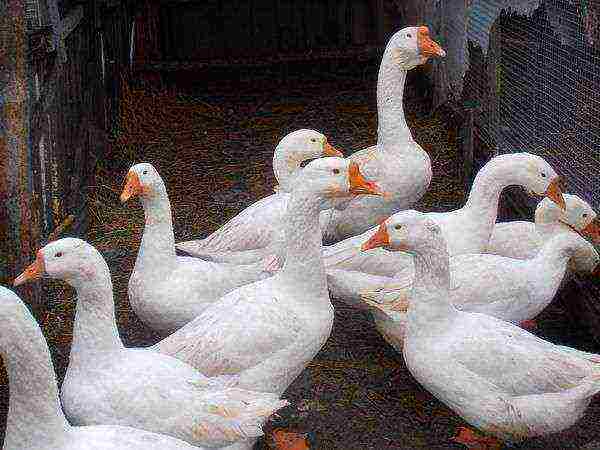
Toulouse
The purpose of the content is meat, fluff, liver for pâté. The liver of one individual grows up to 500 grams. The live weight of the Toulouse goose reaches 12 kg.As a rule, this particular bird is baked with apples for Christmas.
Flaws: conditions of detention are harsh. Not less than 20 degrees Celsius, no drafts, maintaining humidity. Low egg production and survival rate of offspring.
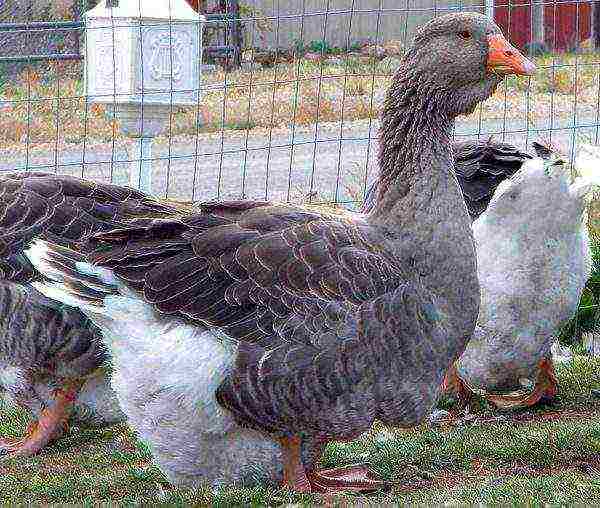
Arzamas
The weight of the goose is 6-6.5 kg, the female lays about 30 eggs per year, of which about 85% will hatch.
Geese are not whimsical to care for, have a good appetite and digestion, are not pampered, and are quite hardy. This bird has a well-developed maternal instinct and excellent brooders hatch from the geese.
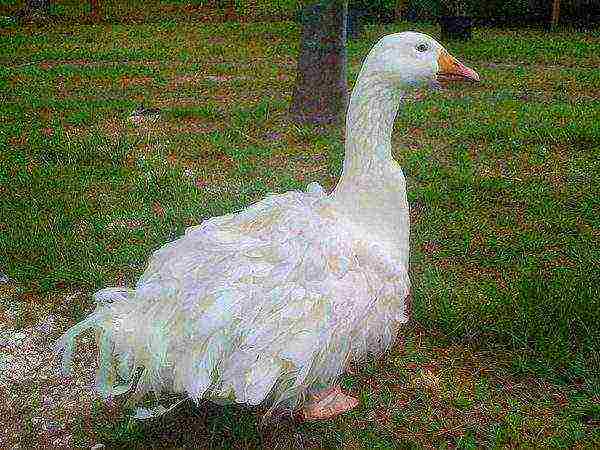
Depending on the goal that the farmer pursues, the sale of meat, the collection of eggs or down, it is worth choosing your own breed of geese and carefully monitoring the content of the livestock. Hygiene, proper nutrition and animal care will ensure a profitable and enjoyable goose breeder.
